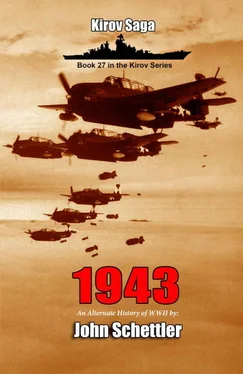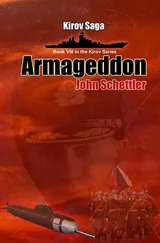Then there was Kamenski…. Fedorov was already beginning to think he may not be native to the timeline in 2021, that he might even be a man from some future time. He was a Keyholder, that much is certain, and he claimed to have the Master Key, the one he left on the nightstand before he unaccountably vanished aboard Kirov .
The keys were the deepest part of this whole mystery—seven keys. Professor Dorland claimed that some had carefully machined serial numbers that corresponded to coordinates. That was why they had sought to save the Rodney , for that key had once been in the possession of Dorland himself. In fact, he claimed to find in on some odyssey involving the German battleship Bismarck .
So yes, there were other travelers in time. Kirov was not the first. And considering that these keys were all hidden away as they were, the question of who put them there leapt to the forefront. Who made them?
He had come to the conclusion that they were made in the future, yet the key they sought on the Rodney had been first found embedded in the base of the Selene Horse, an artifact of ancient Greek sculpture. Kamenski never really stated exactly how he came by the key he possessed. Fairchild told him the key that led her to Delphi had simply been delivered to her, and that she knew of at least one other key, though she could not say who possessed it.
Now he came to feel that all of Karpov’s assertions and suspicions were somehow wrapped up in the mystery of these keys, and connecting the dots in his mind, he suspected they all had something to do with the Tunguska Event. That impact was largely ignored around the time it occurred. It produced quivering lines on some seismic equipment, painted the night skies with eerie light as far away as London, and generated a few headlines in world newspapers, but little more was ever known of it until Leonid Kulik’s expedition in 1927, more than two decades later. There was much speculation and research done after that, yet none of it discovered that vortex they had run into aboard the Novosibirsk , at least not on the meridian I first came from, he thought.
It is very clear that this meridian is quite different, perhaps irretrievably different. He sighed, thinking that everyone seemed to be working at cross purposes. Fairchild seemed to be intent on ferreting out those other missing keys. In fact, the box she found at Delphi had clearly been engineered to hold all seven. Why? Was it meant that they should all be gathered there?
Thinking about that, Fairchild had used that box to move her entire ship in time, and then asserted that the hunt for the key aboard Rodney must have been the reason for that. So her key would lead Argos Fire to a place where she might find another. Interesting. And she had that mysterious box where they could all be collected together…. Then what?
The prevailing wisdom was that these keys secured hidden doors that protected time fissures created by the Tunguska event. Those doors were all locked, so why would it be necessary to gather all the keys into one place—into that box, where a clever recess was embedded in a hidden drawer to hold each one. Was that just for safekeeping, or did it have some other purpose?
All these things went round and round in his head, as confusing as they were helpful. He had only a part of this puzzle, but somehow, he thought the quest for these keys would reveal much more. Yet Kamenski seemed convinced that it could not be Kirov that would undertake that quest. They had to go home, but how could they do so while still leaving Volkov here, let alone Orlov?
“Well?” Karpov pressed him. “What’s it going to be, Mister Fedorov? Are you siding with Volsky and Gromyko on this? Will you stand with me? Help me convince them that we simply cannot leave here, not now, not yet; not while there is so much left undone, and Volkov is at large here.”
Fedorov shrugged, his eyes on the desktop, heart heavy as he realized Karpov was correct. They could not leave now—at least not without dealing with all the other loose ends that would be left behind, and chief among them was Ivan Volkov.
“What could we do about him?” he said slowly. “Is there any way we could get to him?”
Karpov smiled. “Ah,” he said. “Assassination? Don’t think I haven’t considered that. He’s very well protected. Believe me, I captured his Chief of Security during one of those Zeppelin raids he staged at Ilanskiy. In fact, I almost bagged Volkov himself. This man, Kymchek, has been very cooperative in revealing the security layers Volkov has around him. Remember, Volkov was a Captain in Russian Naval Intelligence, so he’s very clever; very cautious. Could we get to him with an expert marksman… Perhaps. It would certainly be worth a try. Historians probably wondered why no one could take out Hitler. Oh, they tried, but there must have been countless opportunities where a man with a rifle might have changed the course of WWII.”
“Alright,” said Fedorov. “I’m convinced that we just can’t pull up anchor and take a risk shifting now with Kirov , and I think I can convince Volsky and Gromyko as well.”
“Excellent!” said Karpov. “Now you’re talking. I had hoped you would see reason, and you did not disappoint me.”
“Hold on. Let me finish. Yes, you’ve convinced me we cannot simply leave—at least not now. We’ll have to see to all the other loose threads here first, and get them resolved. Some of the work has already been done. There was a brigade of modern British troops that fell through in southern Egypt. I was there when it happened.”
“Tyrenkov got wind of that,” said Karpov. “Yet we don’t have the details. Fill me in.”
“It occurred when Russia targeted the BP facilities at Sultan Apache in southern Egypt. As we both know, a nuclear event can rupture time, and it certainly did, but for a reason that I have yet to disclose.”
“Still keeping secrets?” said Karpov, wagging a finger.
“It comes back to Tunguska—all of it,” said Fedorov. “You remember that mission I ran against Ilanskiy?”
“Certainly. That wasn’t very sporting of you, Fedorov. It took me nearly a year to rebuild that railway inn and staircase.”
“Sorry, but I was possessed with the thought that Ilanskiy represented a grave threat. It still does. Only our restraint has prevented us from doing something catastrophic. Well… On that mission, we got lost in a storm, and were hovering low looking for clues to get back on course. Orlov was down in a sub cloud car and he saw something on the tundra below. We stopped to investigate, and found it was just one of those cauldron sites that they tell stories about back home.”
“Ah yes,” said Karpov. “The mysteries of Siberia. It’s all nonsense.”
“Not quite,” said Fedorov. “Orlov found something there, and I think it was a fragment from the Tunguska Event. He had it with him when we were in the desert, and very near the site of Sultan Apache when that incident occurred. I think that object had much to do with opening that fissure that sent the British 7th Brigade through from our time. Yet it’s irrelevant now. There was another incident at Tobruk. I learned that from Tovey when I contacted him on the secure radio set.”
“Yes, Fedorov. As long as we’re confessing things here, I was listening in on that conversation as well.”
Fedorov shook his head. “You certainly are devious, Karpov.”
“No more than you, Fedorov.”
“Very well, then you already may know that the Brigade, as they called it, is gone. That Tobruk event ruptured the continuum again, only this time I think something more got through—one of our own goddamned missiles. I’m not sure how it happened, but it did.”
Читать дальше












